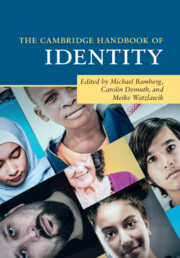Book contents
- The Cambridge Handbook of Identity
- The Cambridge Handbook of Identity
- Copyright page
- Contents
- Figures
- Tables
- Contributors
- 1 Identity: With or Without You?
- Part I The Origin and Development of the Concept of Identity
- Part II New Perspectives and Challenges
- Part III Methodological Approaches
- 11 A Narrative Practice Approach to Identities: Small Stories and Positioning Analysis in Digital Contexts
- 12 Conversation Analysis and Ethnomethodology: Identity at Stake in a Kinship Carers’ Support Group
- 13 Foucauldian-Informed Discourse Analysis
- 14 A Methodology to Examine Identity: Multimodal (Inter)action Analysis
- 15 Autoethnography
- 16 A Sociocultural Approach to Identity through Diary Studies
- 17 Positioning Microanalysis: A Method For the Study of Dynamics in the Dialogical Self and Identity
- 18 Synthesized or Confused Field? A Critical Analysis of the State-of-the-Art in Identity Status Research Methods
- 19 Criminals’ Narrative Identity
- 20 Experimentation within the Social Identity Approach: History, Highlights, and Hurdles
- Part IV Current Domains
- Part V Where Is Identity?
- Author Index
- Subject Index
- References
13 - Foucauldian-Informed Discourse Analysis
from Part III - Methodological Approaches
Published online by Cambridge University Press: 29 October 2021
- The Cambridge Handbook of Identity
- The Cambridge Handbook of Identity
- Copyright page
- Contents
- Figures
- Tables
- Contributors
- 1 Identity: With or Without You?
- Part I The Origin and Development of the Concept of Identity
- Part II New Perspectives and Challenges
- Part III Methodological Approaches
- 11 A Narrative Practice Approach to Identities: Small Stories and Positioning Analysis in Digital Contexts
- 12 Conversation Analysis and Ethnomethodology: Identity at Stake in a Kinship Carers’ Support Group
- 13 Foucauldian-Informed Discourse Analysis
- 14 A Methodology to Examine Identity: Multimodal (Inter)action Analysis
- 15 Autoethnography
- 16 A Sociocultural Approach to Identity through Diary Studies
- 17 Positioning Microanalysis: A Method For the Study of Dynamics in the Dialogical Self and Identity
- 18 Synthesized or Confused Field? A Critical Analysis of the State-of-the-Art in Identity Status Research Methods
- 19 Criminals’ Narrative Identity
- 20 Experimentation within the Social Identity Approach: History, Highlights, and Hurdles
- Part IV Current Domains
- Part V Where Is Identity?
- Author Index
- Subject Index
- References
Summary
Foucauldian-informed discourse analysis (also known as poststructuralist discourse analysis) is an important method for identity researchers because it focuses on the understandings people use to make sense of themselves. Foucauldian-informed discourse analysis examines what ideas people use to make sense of themselves; how these ideas come to be “thinkable” at that moment; and the consequences for what someone can say, think, feel or do when thinking with these ideas. In so doing, it offers a critical approach that also opens up directions for more affirmative ways of thinking. In this chapter, we explain some key concepts informing Foucauldian-informed research, including discourse and genealogy; power as productive, diffuse, and disciplinary; normalization, confession, and governmentality; and subject positions and technologies of self. We discuss how psychologists developing discourse analysis in the UK both engaged with, and blended, Foucauldian concepts with other linguist approaches, producing a diverse body of work. With no established procedure for Foucauldian-informed discourse analysis, this chapter offers two worked examples from separate projects related to identity and health, showing the reader how these concepts can be operationalized in the study of identities. Using an analysis of body mass index (BMI) and data from a study on how couples in long term relationships navigate lifestyle advice after a diagnosis of coronary heart disease, we showcase the value of Foucauldian-informed discourse analysis for identity researchers, particularly when identity is central in the organization of neoliberal societies.
- Type
- Chapter
- Information
- The Cambridge Handbook of Identity , pp. 285 - 303Publisher: Cambridge University PressPrint publication year: 2021
References
References and Further Reading
- 5
- Cited by

